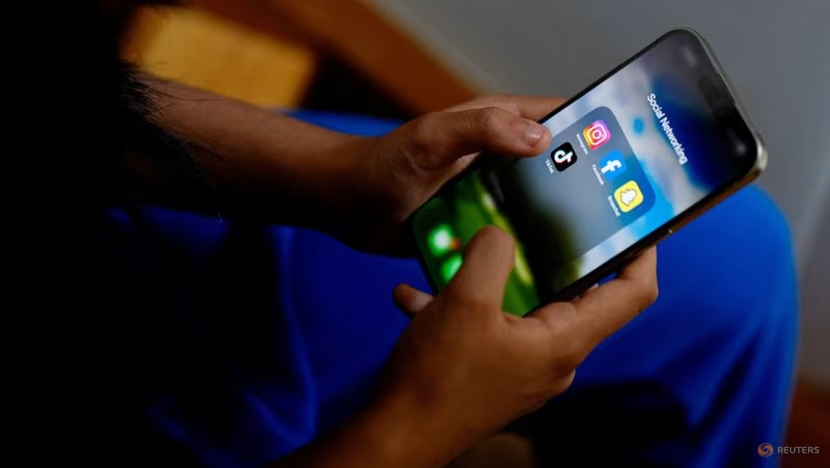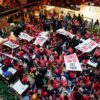SYDNEY (Reuters) – Australia approved a ban on social media for children under 16 on Thursday after an emotional debate that gripped the nation, prompting a tough crackdown targeting Big Tech. Set a standard for jurisdictions worldwide with one of the most comprehensive regulations.
The law forces Instagram and Facebook owner Meta ( META.O ) and tech giants TikTok to prevent minors from logging in or face fines of up to A$49.5 million ($32 million). Testing of enforcement methods will begin in January and the ban will come into effect within a year.
Social media minimum age Bill Sets Australia as a test case for a growing number of governments. That is There are plans to introduce age restrictions on social media amid concerns about the mental health impact on young people.
Countries including France and some US states have passed laws to limit access to minors without parental permission, but the Australian ban is absolute. Florida’s complete ban on under-14s is being challenged in court on free speech grounds.
Passing the law after a marathon final day of Australia’s parliamentary year marks a political victory for centre-left Prime Minister Anthony Albanese, who is running for re-election in 2025 amid declining opinion polls. The ban faced opposition from privacy advocates and some children’s rights groups, but according to the latest polls, 77 percent of the population wanted it.
Domestic media backed a ban led by Rupert Murdoch’s News Corp ( NWSA.O ) until 2024, amid a parliamentary inquiry that heard evidence from parents of children self-harming because of social media bullying. , opens a new tab, the country’s largest newspaper publisher, with a campaign called “Let Them Be Kids”.
But the ban could strain relations with Australia’s key ally the United States, where X owner Elon Musk, a central figure in President-elect Donald Trump’s administration, said in a post this month. This It appeared to be a “backdoor way of controlling all Australians’ internet access”.
It also builds on the current mood of rivalry between Australia and most US-based tech giants. Australia was the first country to force social media platforms to pay royalties to media outlets for sharing their content and now plans to threaten them with fines for failing to crack down on scams.
A spokesperson for Meta said the Facebook owner respected Australian law, but was “concerned” about the process, which passed legislation “failing to properly consider the evidence, age What the industry already does to ensure consistent experiences, and the voices of young people.”
“The task now is to ensure that there is a fruitful consultation on all the rules associated with the Bill to ensure a technically viable outcome that does not overburden parents and young people and a commitment that the rules apply to all Teens will be permanently on social apps,” the spokesperson said.
Snapchat parent Snap (SNAP.N), opens a new Tab it. will A spokesperson for Snap said in an email that it complies with laws and regulations in Australia but has raised serious concerns about the legislation.
“While there are many unanswered questions about how this law will be implemented in practice, we will work closely with the government and the eSafety Commissioner during the 12-month implementation period to help develop an approach that Find privacy, security, And practicality,” the spokesperson said.
Representatives for TikTok and X, which the government said would be affected by the ban, were not immediately available for comment.
The companies – including Alphabet’s ( GOOGL.O ), whose subsidiary YouTube is exempt because it is widely used in schools – had argued that the legislation should be delayed until after the age verification trial.
“It’s the cart before the horse,” said Sunita Bose, managing director of the Digital Industry Group, which has most social media companies as members.
“We have the bill but we don’t have guidance from the Australian government on what are the right ways to use a whole host of services under this law,” Bose told Reuters. need.”
Nation divided
Some youth advocacy groups and academics warned that the ban could cut off the most vulnerable youth, including LGBTQIA and immigrant youth, from support networks. The Australian Human Rights Commission said the law could be breached. human being rights of young people by interfering with their ability to participate in society.
Privacy advocates, meanwhile, warned that the law could increase the collection of personal data, paving the way for state surveillance based on digital identities. A last-minute change in the bill clarified that platforms must offer users an alternative to uploading identity documents.
“These boomers are trying to tell young people how the Internet should work to make themselves feel better,” said Sarah Hanson-Young, a left-leaning Greens senator, late in the Senate’s passage of the bill. Before she was sitting with 34 votes. 19.
But parent groups pushed for intervention, seizing on comments from US Surgeon General Vivek Murthy who said in 2023 that social media was exacerbating the youth mental health crisis to the point where it warranted a health warning. should
“Putting an age limit and giving control back to parents, I think that’s a starting point,” said Australian anti-bullying lawyer Ali Halak, whose 17-year-old son, Elam, lost his life in 2009 after being bullied on social media. Took life.
Annie Lam, a Sydney school student who recently turned 16, said social media contributed to body image issues and CyberbullyingBut a total ban could lead young people to less visible, more dangerous parts of the Internet.
“It will only create a generation of young people who will be more technologically literate in bypassing these walls,” he told Reuters. “It won’t have the desired effect.”
“We all know that social media is not good for us but banning social media usually sees many young people who are strongly against it.”











